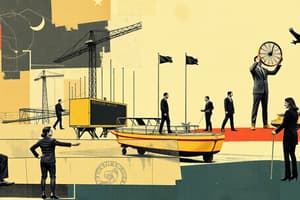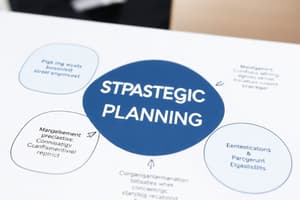Podcast
Questions and Answers
What is the first step in the planning process?
What is the first step in the planning process?
- Implement action plans and evaluate results
- Identify and select ways to achieve objectives
- Define objectives (correct)
- Evaluate current standing against objectives
Long-range plans typically cover a time horizon of two years.
Long-range plans typically cover a time horizon of two years.
False (B)
What approach involves predicting future events to aid in planning?
What approach involves predicting future events to aid in planning?
Forecasting
The process where supervisors and subordinates collaborate to set performance objectives is known as ______.
The process where supervisors and subordinates collaborate to set performance objectives is known as ______.
Match the planning types with their descriptions:
Match the planning types with their descriptions:
Which type of control acts as a preventative measure taken before a task starts?
Which type of control acts as a preventative measure taken before a task starts?
Benchmarking is a planning technique that involves internal comparisons only.
Benchmarking is a planning technique that involves internal comparisons only.
What is the final step in the control process?
What is the final step in the control process?
_____ controls are measures taken as a task is happening to ensure correctness.
_____ controls are measures taken as a task is happening to ensure correctness.
What does 'Financial control' primarily analyze?
What does 'Financial control' primarily analyze?
Flashcards
Planning
Planning
Setting performance goals and deciding how to achieve them.
Short-Range Plan
Short-Range Plan
Plan for one year or less.
Strategic Plan
Strategic Plan
Long-term direction for the organization.
Control Process
Control Process
Signup and view all the flashcards
Feedforward Control
Feedforward Control
Signup and view all the flashcards
Concurrent Control
Concurrent Control
Signup and view all the flashcards
Feedback Control
Feedback Control
Signup and view all the flashcards
MBO (Management by Objectives)
MBO (Management by Objectives)
Signup and view all the flashcards
Contingency Planning
Contingency Planning
Signup and view all the flashcards
Operational Plan
Operational Plan
Signup and view all the flashcards
Study Notes
How Do Managers Plan?
- Planning is setting performance objectives and deciding what actions are needed to meet them.
- A plan is a set of actions to achieve an objective.
- Planning involves organizing, leading, and controlling.
- Steps in planning: Define objectives, analyze current position, develop premises, identify alternatives, choose a plan, and implement.
- Planning benefits include focus, flexibility, action orientation, coordination, and time management.
What Types of Plans Do Managers Use?
- Short-term plans (one year or less) and long-term plans (five years or more).
- Strategic plans guide long-term direction.
- Operational plans detail how to implement strategic plans.
- Organizational policies guide behavior (like sexual harassment policy).
- Procedures define specific actions.
What Are Useful Planning Tools and Techniques?
- Forecasting predicts future events.
- Contingency planning prepares for unforeseen circumstances.
- Scenario planning analyzes future possibilities.
- Benchmarking compares performance to others.
- Participation involves stakeholders in the planning process.
What Is the Control Process?
- Controlling monitors performance and takes corrective action.
- Four control steps: Set objectives, measure performance, compare results, and take action.
- Feedforward controls anticipate potential problems.
- Concurrent controls manage ongoing processes.
- Feedback controls evaluate completed actions.
- External control is supervisory or administrative.
- Internal control is self-managed.
What Are Common Organizational Controls?
- Management by Objectives (MBO): Supervisors and subordinates jointly set and review objectives.
- MBO is participatory, clarifying performance targets and support.
- Discipline is behavior modification through fair reprimand.
- Financial controls analyze financial ratios (liquidity, assets, profitability.)
- Operations control focuses on efficiency in areas like inventory, purchasing, and quality.
Studying That Suits You
Use AI to generate personalized quizzes and flashcards to suit your learning preferences.




